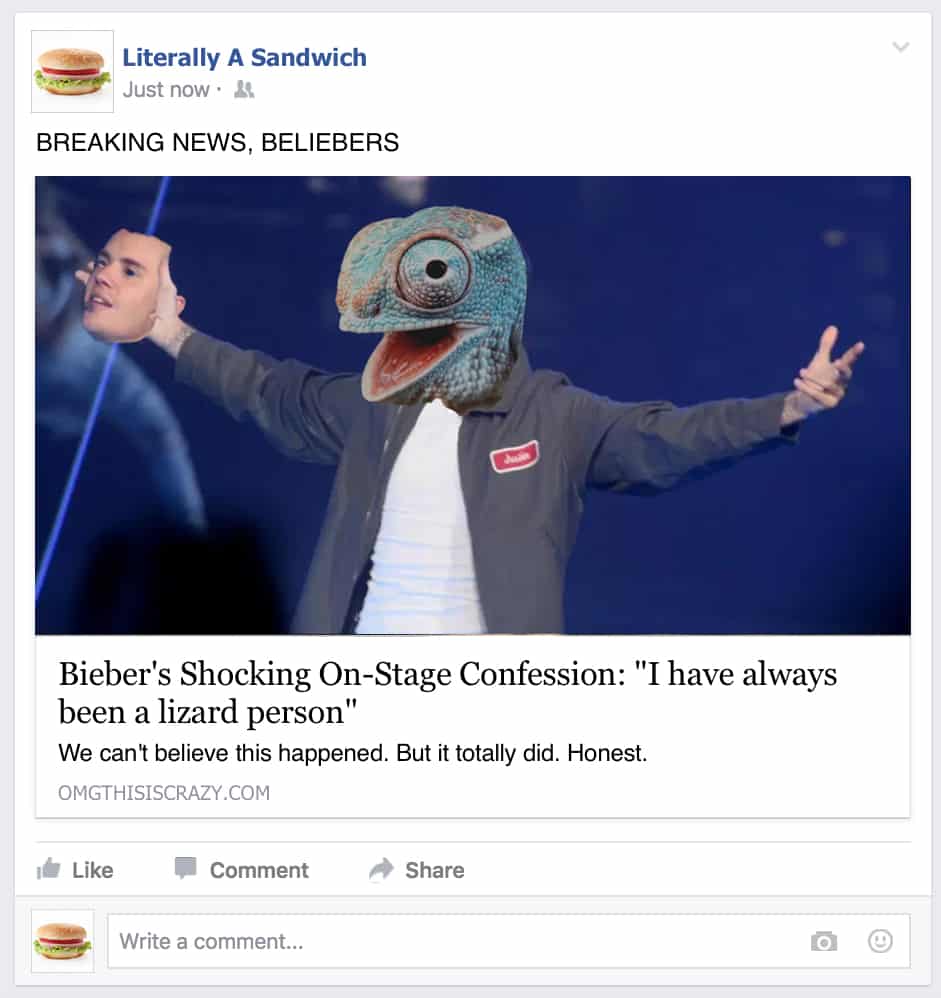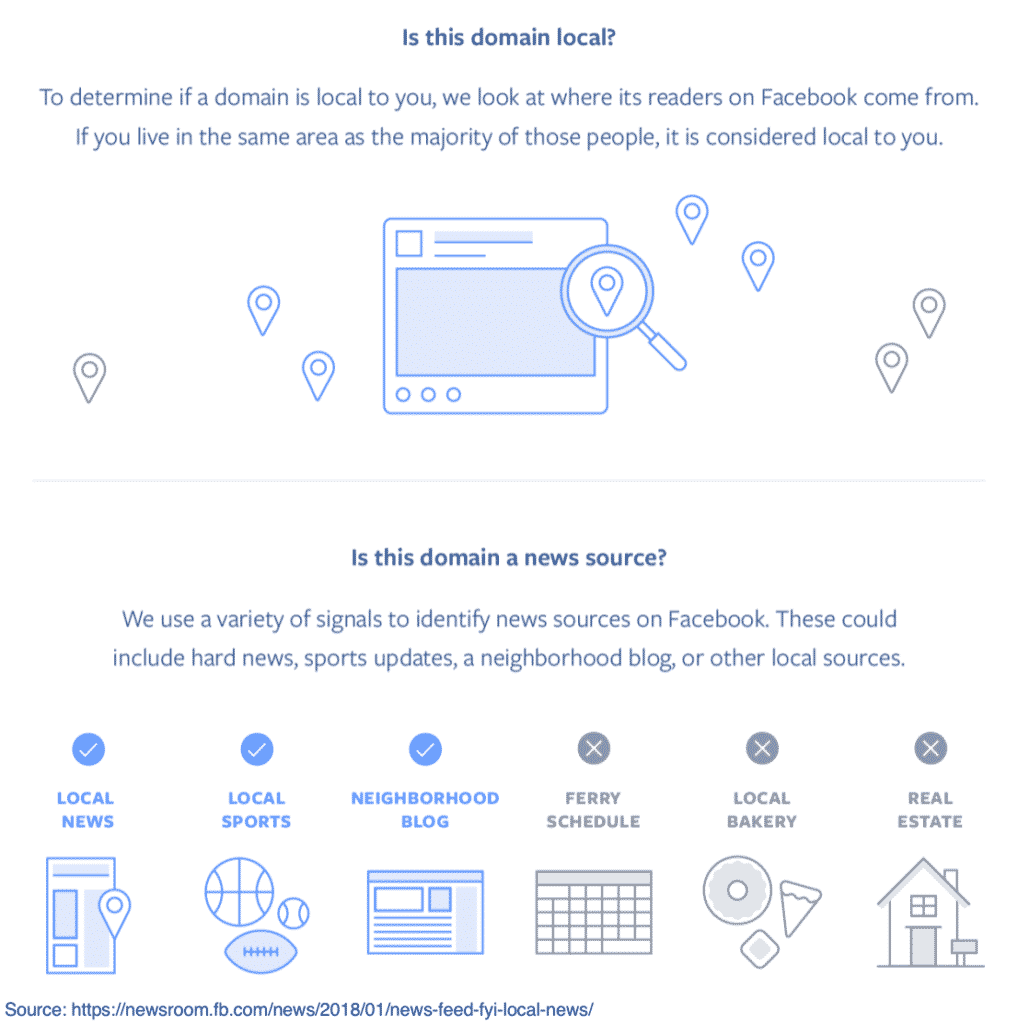Table of Contents:
Facebook Has Announced Three Big Algorithm Changes in Three Weeks

Table of Contents:
Did you catch that big Facebook announcement recently?
No, the other one.No, the other other one.
Facebook spent the first month of 2018 sharing not one, not two, but three changes to how it determines what people will see in the News Feed.
If you have a Facebook Page, you're gonna want to know what each of these changes is - especially because some could affect you a lot more than others.
So, what's new and different?What do these changes mean for your strategy - and what don't they mean?Let's take a look back and recap Facebook's January 2018 algorithm announcements!
Fewer posts in the News Feed from businesses, brands, and media
The first one is kind of a doozy.
Right at the start of 2018, Facebook announced that the News Feed would start showing users more updates posted by their friends and family, and fewer updates posted by businesses, brands, and media.
If you're a social media marketer, that probably doesn't sound like great news.
We wrote a blog post about this that goes a lot more in-depth (which you can read right here), but here's the short version:
Facebook Pages are going to have less real estate in the News Feed available to them, so making your Page competitive is extra important.
And how does Facebook want you to do that?
As their news release puts it: “Page posts that generate conversation between people will show higher in News Feed.”
That means when you write updates for Facebook, you should think about their potential for encouraging engagement - especially comments.(For example, updates like links or videos that prompt discussion by asking questions.)
Just remember that not all engagement is good engagement.
At the same time that all of this is happening, Facebook is also monitoring more closely than ever for posts they consider engagement bait - updates that are engineered to rack up lots of engagement like reactions and comments, but are generally low in value.
Posting engagement bait won't just negatively affect the visibility of the individual updates meeting that criteria - it can actually mean lower reach for your Page as a whole.(So, you know, that's bad.)
Here's a post we wrote that explains what engagement bait looks like, complete with examples: The Five Types of “Engagement Bait” That Will Make Facebook Downrank Your Posts and Demote Your Page
Okay - share more updates that encourage authentic engagement. That's one Facebook announcement down, two to go!What else is new in early 2018?
Showing more news from "trusted sources"
If you're like most people, you probably can't wait until you never have to hear the words "fake news" ever again.

The ugly truth, though, is that Facebook has historically been the epicenter of a disinformation epidemic - one serious enough to get them called before Congress in late 2017. Point is, Facebook knows that actual fake news - as in, objectively and provably untrue stories - is a problem they have to address.
So, what are they doing about it? Facebook announced in early 2018 that they want to better understand whether a news source is trustworthy, so that the News Feed can prioritize stories from sources people trust. To determine whether or not a news source is trustworthy, Facebook is surveying users and gathering their feedback.
Scared? Don't be! This isn't particularly different from other quality surveys Facebook has issued in the past. (It isn't even the first time they've included questions about whether or not users trust a particular news source!)
Surveys like this generally teach Facebook to look for certain signals that can help their algorithm determine on its own whether a piece of content or a source meets certain criteria.
(In the past, for example, Facebook has trained its algorithm to identify whether or not a link is likely to be click bait.)
What does that mean for YOU?
According to Facebook's announcement, publishers that users deem trustworthy may start seeing better reach, and ones that don't score high for trustworthiness might see their reach drop.
For better or worse, though, the first iteration of Facebook's survey regarding trustworthiness isn't particularly in-depth - and that means your job is fairly simple.
Basically, don't betray the trust of the people who might see your updates - and for the record, that's more complicated than just not lying.
Take click bait headlines, for example. It can be tempting to sensationalize a little bit when you're writing a headline or an update, but exaggerations can frustrate users and break their trust.
(How many times have you clicked a link that promised to "totally blow your mind," only to find that your mind wasn't even alittle bit blown?)
When you're writing headlines and updates for Facebook, stick to the facts, keep it real, and don't promise anything that your content doesn't actually deliver - because if Facebook asks someone how much they trust you, you want them to give a good answer!
Now, on to Facebook's final News Feed-related announcement from January 2018!
What did they have to say right at the tail end of the month?
Expect more local news in your Facebook Feed
In the final days of January, Facebook announced that you can expect more of the news in your Feed to come from local sources - and they have a fairly specific idea of what exactly that means.
Facebook hopes that showing users more local news will have a positive effect on their communities, so local news publishers should expect better visibility in the News Feed.
But who IS a "local news publisher," exactly?On the one hand, this classification has nothing to do with size - which should make it pretty good news for small publishers who might feel disadvantaged compared to major national news organizations.
(Basically, it won't be as hard for a community arts news blog to compete for News Feed space against The Washington Post.)On the other hand, though, a "local news publisher" doesn't necessarily always include local businesses.Facebook identifies local news publishers based on whether they are local, and whether they are a source of news:

As their image shows, simply being local isn't always the same as being a local news source - but the extent to which this affects news content shared by a business (you know, like what you're reading right now?) remains to be seen.
Because as you know, news sources and businesses aren't always mutually exclusive! A local bakery, for example, could write and share blog posts with baking tips and recipes. A real estate agent could post articles about home inspections and renovations - even ones written specifically for their local audience!
How will this one affect YOU?
Facebook's initiative to prioritize local news is fairly new - and that means it's too early to tell where they'll draw the line regarding certain content sources.
Ultimately, though, there's little it can do to harm your visibility. (Unless, you know, you're actually with The Washington Post.)A shift from broad, national news toward targeted, local news means Facebook wants to hone in on what's interesting and relevant to specific users - not necessarily to everyone.
Instead of showing users content that it thinks matters to people in general, Facebook wants to show them content that it thinks matters to them specifically as an individual.
By creating and sharing content that's targeted to a specific type of audience, then, you're creating the type of content that Facebook wants to prioritize in the future!(Not sure how to do that? Start with this post: How to Create Audience Personas That Are Actually Super Useful)
If you're like the local baker or the real estate agent who blogs about newsworthy topics, it's too early to say whether this algorithm update will necessarily impact your visibility - but no matter what type of business you are, as long as you're sharing content that's relevant to your specific target audience, you're playing the long game pretty well!
Subscribe to our newsletter
Are you ready to automate your socials?
Say goodbye to manual scheduling and hello to effortless automation.


